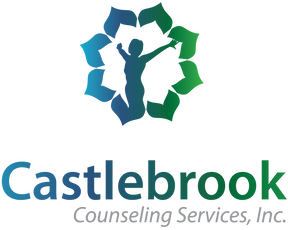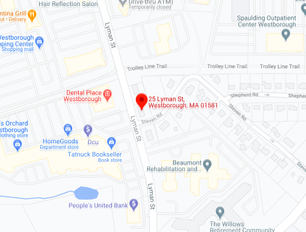Clinician Spotlight: An Interview with David Polidi, LICSWWelcome to the third installment of Clinician Spotlight, a series where I sit down with some of our wonderful therapists for a cozy conversation about work, mental health, and many life tidbits in between. This month, I had the opportunity to speak with David Polidi, LICSW. David specializes in trauma, EMDR, and runs a popular couples’ workshop at Castlebrook. David discussed his journey towards trauma-focused practice, the importance of deep conversation, and interestingly, his previous life as a street magician.
Lauren: Hi David! Thank you for sitting down with me to chat. Can you tell me a little bit about your career journey thus far? David: Sure! My career in the field began in the Massachusetts public school system as a guidance counselor where I was for about six years. Then, I went back to school and started working at nonprofit agencies where I focused on community mental health. During this time, I was trained in the ARC model (Attachment, Regulation, Competency) which I applied to working with families that had experienced trauma, especially children. With the pandemic, I pivoted and started working at Castlebrook which allowed me to continue focusing my training on trauma-specific approaches. I had some prior interest in trauma, but I went deep into the trauma world here. Lauren: Is there anything specific that was a catalyst for you to step into that world? David: I believe that I came into this field for a reason. I read this article a long time ago called “Wounded Healers” by Carl Jung about how we’re all kind of wounded and are able to offer support from our own journeys. I definitely wanted to be there for others and to study different evidenced based approaches that aligned with trauma work. I’ve always been interested in the mind though. I grew up in NYC and I was a magician [laughs]. I love magic and I actually did magic on the streets of New York to save for college. Magic is connected to different things, part of it being psychological. You can do amazing things with your hands, but the magic happens in people’s minds. In addition to magic, there is this piece of hypnosis which I’ve always been fascinated with too. All of this culminated in an interest in psychology, but for trauma, I’ve had my own journey with my own experiences and I wanted to learn more about it. I’ve actually had EMDR (Eye Movement Desensitization and Reprocessing) done on myself, too! Lauren: Do you feel like experiencing EMDR yourself has informed your ability to practice it and feel comfortable? David: It has definitely helped me to understand what it’s like to be a client. It’s scary and it’s hard work. For me personally, I love to talk through things and be in my head so EMDR gets you to a place where you can take all of the wonderful stuff in your head and see if you can step aside a little bit to get in touch with it. That’s been a meaningful journey for me. Lauren: EMDR seems to have certainly caught your attention! What other modalities have you explored? David: Internal Family Systems, or IFS. EMDR led me to IFS which, to me, feels like EMDR on steroids. The IFS model kind of creates a map for beginning to dive into your mind with EMDR. You can work with a client to start mapping out the different parts of the self and help the client prepare and feel safe to explore deeper trauma work. Lauren: I know a magician never reveals their tricks, but what would you say has been one of your most successful EMDR interventions that you do with your clients? David: Definitely resourcing. While some approaches boast that everything you need to heal is inside of you, other approaches, such as EMDR, acknowledge that there are external things that can help people. For instance, one resource I help people build up is called a safe space, or if somebody doesn’t like that word, we can use “safe enough” space. You envision a sacred, beautiful space, imagined or not, and really try to feel yourself there. You allow yourself to experience what your nervous system feels like in this safe space and build upon that resource with more positive images or ideals. Another example of this is parents–who would have been a really great mother or father? What would having that person in different stages of your life have felt like? The more you practice, the more you’re able to get into those calm states. So when you’re eventually going into the trauma spaces and feeling activated, you can bring in some of the positive resources to help the nervous system regulate itself before getting back into the deeper level of work. The person-centered approach, human connection, and wisdom of the trauma field is very interesting to me. Lauren: Speaking of human connection, what are some things in your life that are important to you outside of work? David: Well, I think it’s important to mention my favorite artist–my daughter! She’s really good. I live with my wonderful, inspiring wife, my artistically talented daughter, and two furry creatures; a dog named Nala and a cat named Fozzy. They’re very therapeutic. Lauren: What’s been exciting you about your work recently? David: I have my couples workshop that I’ve been running called Deepening the Conversation. I’m all about conversation in any shape or form. While I work with both individuals and couples, I actually find the work to be quite similar. There are parallels between listening to the parts inside yourself and having a didactic conversation with another person. There are certain things that help move a conversation along whether it’s with yourself or with each other; you need to make room for different perspectives, listen, and develop a deep level of understanding of the different parts (or people) involved. For future directions, I’m interested in learning more about dissociation and its connection to trauma. Lauren: That’s great! Before we end, can you demonstrate a magic trick? **David goes on to blow Lauren’s mind with a card trick related to his IFS work** David: In my heart, I am so many things, but one of the things I admire about people is being able to be a storyteller. If I can use my magic tricks to tell a good story and help people remember the imagery of what I’m telling, it can be something really special that they can take with them. It’s another way to externalize the work and make it tangible for people; I’m excited to start using more of it in my practice.
0 Comments
Your comment will be posted after it is approved.
Leave a Reply. |
Archives
May 2025
Categories |
Mission Statement
Castlebrook Counseling Services, Inc. is a group of private practice clinicians with a shared goal of strengthening our community by providing therapy and clinical support designed for children, adults, and families to successfully meet life’s challenges.
 RSS Feed
RSS Feed

